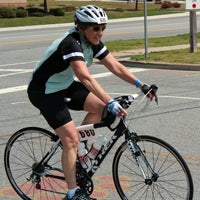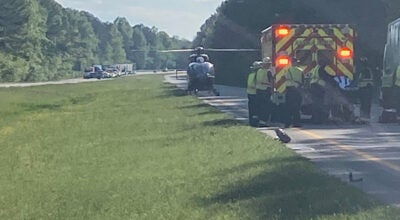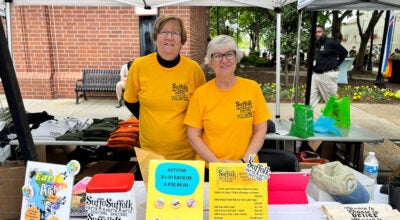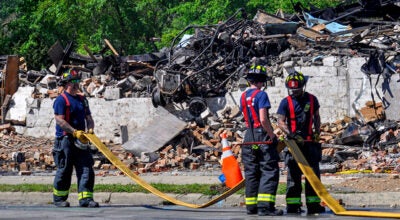Riding for health, education
Published 8:26 pm Saturday, March 2, 2013
Editor’s note: This is another in a series of stories leading up to the American Diabetes Association’s Tour de Cure in Suffolk on April 20.
Paul Sperling was pre-diabetic and knew he needed to make a change when he signed up for the 2012 Tour de Cure on its inaugural visit to Suffolk.
He started bicycling in part to prepare for the tour. He thought the diabetes research fundraiser was a good cause — his mother died of ketoacidosis, a serious complication of diabetes, and his mother-in-law is a Type 1 diabetic.

Susan Saunders finishes the 2012 Tour de Cure at King’s Fork High School. City employees will once again form a team for the annual American Diabetes Association fund-raiser this year. | Submitted Photo
“It kind of hit home,” he said. “My wife’s whole family is affected by it, I’ve got a lot of friends that are affected by it, and I was on the verge of being affected by it.”
Sperling, an employee of the city’s information technology department, began a City of Suffolk team for the Tour de Cure, a fundraiser for the American Diabetes Association. The team had five members and looks ready to improve on that number for this year’s ride, set for April 20. Many more city employees participated last year, but some already ride with other teams on a regular basis.
“It’s a city team in name more than function,” Sperling said. “It’s just some people that work together that know each other that want to go out and ride.”
The ride, which takes cyclists on one of four different routes throughout Suffolk, will depart from King’s Fork High School. Riders must raise a minimum of $175 plus a $25 registration fee to participate.
Sperling is beating that easily — he raised about $1,500 last year.
He did the 35-mile ride last year because he “didn’t know if I was ready for that at that time,” he said. “When I finished the ride, I wished I had done more.”
This year, he plans to do the 100-mile ride. But after recovering from hip surgery in December, he’ll see how his training goes before he makes a final decision.
Last year’s Tour de Cure and the cycling he has done since then have helped him stop diabetes in its tracks, Sperling said.
“I lost 55 pounds,” he said. “I’m almost as active as I was back in college and high school. Credit goes partially to the Tour de Cure for giving me some incentive to go out and do it.”
Sperling said he would love to see more people participate, both on the city team and in general.
“We need all the support we can get,” he said. “Education is a really, really big part of this cause, because things are a lot more treatable than people realize with proper education. A lot of diabetic care is not about medication; it’s about diet and exercise.”
Sperling said he hopes one day the American Diabetes Association works itself out of a job.
“With any luck, in the not-too-distant future, we’ll be riding for something else, because we won’t need this anymore,” he said. “I don’t know anybody who doesn’t have a friend or a family member that’s affected by diabetes.”
To learn more about the Tour de Cure, visit www.diabetes.org/hamptonroadsvatour.






